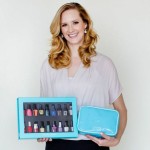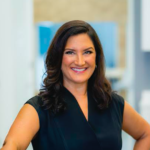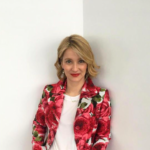This founder took her passion for travel and beauty and turned it into a profession. Aggie is the founder of the fragrance house, Nomaterra. She and her husband travel the world and create specific scents based upon each location. They have developed perfumes, candles, and fragrance wipes that tell a “scentsory” about each location. Aggie was previously a beauty editor at Glamour before leaving to study chemistry at Columbia University. She met her now husband in the lab and they’ve embarked on a professional and literal journey together.
How would you describe Nomaterra in a few sentences?
Nomaterra is a New York fragrance house founded by a husband and wife duo, offering naturally inspired, adventurous, location-centric scents that inspire nostalgic feelings of places you’ve been to or have dreamed about. We want to create “scentsory” experiences that transport one to a different time and place. We capture the soul and authenticity of a destination by researching the natural and artisanal flora and fauna indigenous to a place and incorporating those ingredients in the composition of each location scent. All our fragrances are hand-blended and poured in New York and we never test on animals.
You founded Nomaterra with your husband, Benjamin. How did you both decide to leave your jobs to found a company?
It was actually my job at Glamour that inspired me to consider the possibility of branching out on my own and starting a beauty company. As a beauty assistant at Glamour, I was given the opportunity to interview experts in the industry, people I had looked up to my whole life. I met well respected perfumers and learned about their craft and process of creation: the story, the the inspiration, the science, the meaning behind the bottle, the production process, and how it all came together with marketing in the end.
I always had a very independent spirit from a very young age, and I’ve never been one to follow the herd. I was itching to spread my wings, and try things my way, however naive that may have sounded at the time. There were many signs that entrepreneurship was a natural and obvious choice. I was very ambitious and driven, and had lofty goals that billowed outside of the corporate structure. I was willing to work hard, welcoming sleepless nights if it meant I would be creating something incredible, something inspiring and novel. As much as I wanted to learn from my role models, I didn’t want to be led, I wanted to be a leader. I slowly started realizing that I saw beauty editorial as a supporting character to something bigger, a lifestyle beauty brand based on the things that inspired me the most (and hopefully others as well) — adventure, travel, and a marriage of science and sophisticated beauty.
After much deliberation, I decided to move on from Glamour and go back to school. I attended Columbia University’s post-baccalaureate science studies, and shortly after graduating, I started Nomaterra Fragrances with my husband, Benjamin Burnett (who I happened to have met in physics class at Columbia). We worked out of our tiny NYC apartment at the time, and it was truly a wonderful time. Ben was also like-minded to me in that he had an entrepreneurial spirit, a knack for innovation, and loved creating something of his own and growing it with hard work and ambition. Prior to attending Columbia University, he had started a music production company (he had been a musician his whole life), which he successfully ran for a number of years and from which he used the profits towards his education at Columbia University. In starting Nomaterra, I was lucky to have had Ben by my side, who, as a result of his biochemistry training at Columbia, understood chemistry on a whole other level, and was able to scale our fragrances and make them commercially viable.
Nomaterra is routed in the concept of scent memories. What is one of your favorite scent memories?
Escaping communist Poland for the United States in 1986, our family was excited by the possibility of travel in our new home. With our new-found freedom, my parents and I would take trips around the country at any chance we got. Our first destination came a few years after settling into our new life in New York – we traveled for a week to Miami Beach. It was a multi-sensory experienced we’d never had—turquoise-colored water, pristine white beaches, rustling palm trees, the sound of 80’s hits from Madonna and the like on Ocean Drive, and breathing in the smell of exotic flowers like ylang ylang, orange blossom, and jasmine with every step we took. It was spectacular, and would make the beginning of my love affair with travel-inspired scents and with Miami. It’s a place I still return to frequently and each time those scent memories become deeper and more robust.
Your scents embody places you’ve traveled like Cape Cod, Brooklyn, East Hampton, and Miami. Can you walk me through the process of creating a scent?
The process in which we create our scents is quite unique. One of the best parts is the travel! All the scents we create are based on locations that have some personal connection or influence on us. A major part of making the scents authentic to the location is that we actually do extensive historical, archaeological, anthropological, biological, and geographical research and record in a spreadsheet what flora and fauna grows or used to grow ingenuously in that area, which has a major impact on the smell of the area, as well as specialty foods or spices eaten and used in that area.
We then personally source the ingredients, many of which are natural, organic, exotic, and rare essences of the highest grade from all over the world, incorporating them in our fragrance compositions to capture exactly the right scent of each locale. Often we work with really small distillers, because the oil is very rare or expensive. For example, in creating our Oahu Gardenia fragrance, I recalled from my trip the pure scent of gardenia wafting naturally in the Hawaiian air. Hawaii is also where some of the rarest species of gardenia can be found, so it was paramount that we created our composition around the gardenia flower and that it was natural, not synthetic. However, finding a distiller that had supply of natural gardenia extract was incredibly difficult because it’s a very long and tedious process to extract gardenia oil from petals, and not much comes out so thousands of petals need to be used for just a tiny amount of oil (even more so than a special oil like Bulgarian rose). We were able to find a a very small and artisan distiller that had all natural and organic gardenia oil, and they extract it through the ancient process of enfleurage, where petals are placed in between layers of vegetable fat for months before the gardenia oil form the fat can be extracted.
The process of creating a fragrance usually takes about three months to a year, and sometimes I step aside from a scent project for weeks or months at a time, but I’m always thinking about it, how to make the slightest change to the fragrance to create the slightest scent nuance. I often also revisit a particular location while working on its fragrance to make sure I’m moving it in the right direction and that I’m accurately capturing the true beauty and essence of the place. Once the formula is finished, I pass it on to Ben, who uses mathematics to scale the fragrances and makes sure the measurements are accurate to the 1000th decimal point. He also works with me on making the scents last longer, tests our fragrances, and makes them commercially viable. While I’m involved with more of the artistry of the actual scent, without him, we wouldn’t have the finished product.
Before founding Nomaterra, you were a beauty editor at Glamour. What were your responsibilities in that position?
I was a beauty assistant working under beauty director, Felicia Milewicz. In my role, I wrote beauty articles for print and online publication including: “Daily Deals,” “Glamover,” “New Stuff You’ll Love,” “Cover Confidential,” and “You Tried It.” I generated and maintained key relationships with brand reps, PR reps, and industry professionals in the beauty and fashion industry. I was also given many exciting opportunities, such as interviewing the makeup artists and hair stylists who worked on the cover celebrity for that month, and go backstage at fashion shows and attend beauty launches.
What are some of the best things, and conversely the most challenging things, about starting your own business?
Dealing with uncertainty was one of the biggest lessons I learned. While I’ve always been keen on spontaneity and surprises, business surprises and spontaneous challenges are a whole other story. These can be amazing surprises that you weren’t expecting but take your business to another level, or discouraging surprises that create an temporary obstacle you need to overcome. There are always surprises and unexpected challenges along the way. At the end of the day, you have to push through obstacles and be flexible to change and open to adapting because there is a solution to every situation.
A key lesson I learned was definitely about polite perseverance and persistence. You have to know what your end goals are and keep pushing for them. I once read, “A ‘no’ really means a ‘yes’ later.” This has shown to be incredibly true. Eventually every no can be turned into a yes!
What has surprised you about owning your own business?
You can have a business plan and be an incredibly organized person, but you won’t be prepared for every situation and you have to be able to roll with the punches. Also, you may have a clear vision as to the direction and market that your brand will fit best in, but your core market and customer may reveal him or herself as your brand grows and develops, and they may not always be who you thought your brand would be catering to. This is not a bad thing at all, in fact, as your business grows year after year you start to really fine tune the right target market and the people that your brand philosophy and morals speak to.
What advice would you give to someone who wants to start her own business?
The best advice I was given and would give other entrepreneurs is that a “no,” doesn’t really mean a “no,” it just means you have to be persistent and stick with it until you get a “yes.”
Also, entrepreneurship is all about being able to take calculated risks, you have to approach it with a sense of adventure and not be bogged down by fear of failure. You can’t worry about failure too much because every failure you can eventually turn into a success. To get ahead, you have to be able to jump in.
Additionally, read as much as you can about your field, about business in general, make sure you’re constantly learning and becoming a better business owner.
What would be your best advice for young professionals?
Make sure you give yourself the opportunity to explore different avenues of work while you are young. Each experience makes you unique and helps you stand out in the future against other candidates, or helps you in approaching a new business from a wholesome standpoint. Don’t get bogged down by what your major was or what you said you had to be or do when you were younger, pursue many different experiences that could even be contrasting.
Thank you, Aggie!
































Pingback: My Favorite Career Profile Quotes From 2015 - Elana Lyn